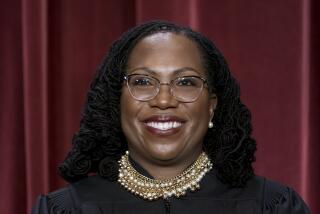All-White Jury Ruled Non-Racist : Constitution: Supreme Court refuses to expand Sixth Amendment rights on an impartial jury for white convicted rapist.
- Share via
WASHINGTON — With members trading sharp words over racism, a divided Supreme Court ruled today that the Sixth Amendment right to a trial by an “impartial jury” is not violated when blacks are excluded from a white man’s jury.
Justice Antonin Scalia, writing for the court in a 5-4 ruling, said the decision was a narrow one and not at all involved in racial politics. He noted that previous rulings have made it clear that blacks may not be systematically excluded from juries.
However, he said the question before the court was “whether the defendant has been denied the right to ‘trial by an impartial jury.’ The earnestness of this court’s commitment to racial justice is not to be measured by its willingness to expand constitutional provisions designed for other purposes beyond their proper bounds.”
Scalia said the heart of the Sixth Amendment was its guarantee of an impartial jury--not one that represents the racial makeup of a community.
In his 13-page decision, Scalia also charged that Justice Thurgood Marshall, the court’s only black member, resorted to waving the red flag of racism.
“Justice Marshall’s dissent rolls out the ultimate weapon, the accusation of insensitivity to racial discrimination--which will lose its intimidating effect if it continues to be fired so randomly,” Scalia said.
“It is not remotely true that our opinion today ‘lightly . . . sets aside’ the constitutional goal of ‘eliminating racial discrimination in our system of criminal justice.’ ”
Scalia continued, “The defendant in this case is not a black man, but a convicted white rapist who seeks to use the striking of blacks from his jury to overturn his conviction. . . . Race as such has nothing to do with the legal issue in this case.”
Marshall charged the majority--the court’s conservative wing comprised of Scalia, Chief Justice William H. Rehnquist and Justices Byron R. White, Sandra Day O’Connor and Anthony M. Kennedy--of insulating an “especially invidious form of racial discrimination.”
“The elimination of racial discrimination in our system of criminal justice is not a constitutional goal that should be lightly set aside,” he wrote.
Marshall was joined by Justices William J. Brennan Jr. and Harry A. Blackmun. Justice John Paul Stevens dissented in a separate opinion.
More to Read
Get the L.A. Times Politics newsletter
Deeply reported insights into legislation, politics and policy from Sacramento, Washington and beyond. In your inbox twice per week.
You may occasionally receive promotional content from the Los Angeles Times.










